Romantic comedies, aka date movies, screwball comedies, or – if the gender balance makes straight guys feel threatened – chick flicks, all belong to the genre that receives the least amount of respect. The reason being that the vast majority are formulaic, predictable boredom killers that take us over familiar ground so often that they have become the comfort food of the movie going public.
Basically, they all unfold as follows:
- Character A is in pursuit of two things: attaining a goal and filling a void in their lives
- Character B comes along, towing their own goals and exuding a personal chemistry that attracts Character A (or vice versa)
- A and B get to know each other by way of a series of humorous encounters or relatively harmless mishaps, endearing them both to the audience so that we will root for them
- A major obstacle presents itself, threatening the relationship between A and B. Is the relationship doomed?
- Of course not; there is always a happy ending. Goals are attained, voids filled, and even if A and B don’t end up together, the film’s ends with all parties – including the audience – as satisfied as if they have just scarfed down an entire chocolate cake.
So how does one determine the best of this tired old chestnut of a genre? Simply take at least one of the steps in the overused recipe and invert it, turn it upside down, inside out, or just throw it away Add some intelligent dialog relating to philosophy or metaphysics and maybe add a third party to spice-up the natural balance. Top it off with some serious social commentary and some snappy editing, perhaps even a dash of kink (critics love all three if you can swing it). Now, season with humor to taste and “Bob’s your uncle.”
The directors of the five selections that follow each used at least one of the options listed above and the results are atomic. Their films are thoughtful, relevant, and, of course, loaded with good humor. They reside somewhere up in the atmosphere, far above the moldy hamper that stores 95% of the genre. These are comedies involving romance, plus a whole lot more – like a beating heart, a thinking brain, and a functioning pair … ingenuity and imagination, that is.

Jules et Jim – Francois Truffaut (1962)
What’s most interesting here is that by the time Truffaut, not yet 30 years old, made his third film, he chose to adapt an autobiographical World War I novel written by a then 74 year old Henri-Pierre Roché. Being one of the founders of the French New Wave, cinema’s youth movement – how could he be bothered with a (now) dead man’s accounts of romantic events from 40 years prior? It was probably that Roché’s earlier bohemian lifestyle fed directly into the 60s attitude that love is fluid and won’t be constrained. Two friends, one shy (Oskar Werner) and the other an extrovert (Henri Serre), both fall for the same free-spirited woman (Jeanne Moreau) and opt to share their relationships in the best interest for all concerned. There’s a heavy element of tragedy that one might argue should exclude the film from the romantic comedy genre, but Truffaut’s non-judgmental attitude provides the film with considerable good humor and a relaxed morality, more than adequately replacing the usual guffaws so associated with romcoms. This is a gem and should be visited over and over again.
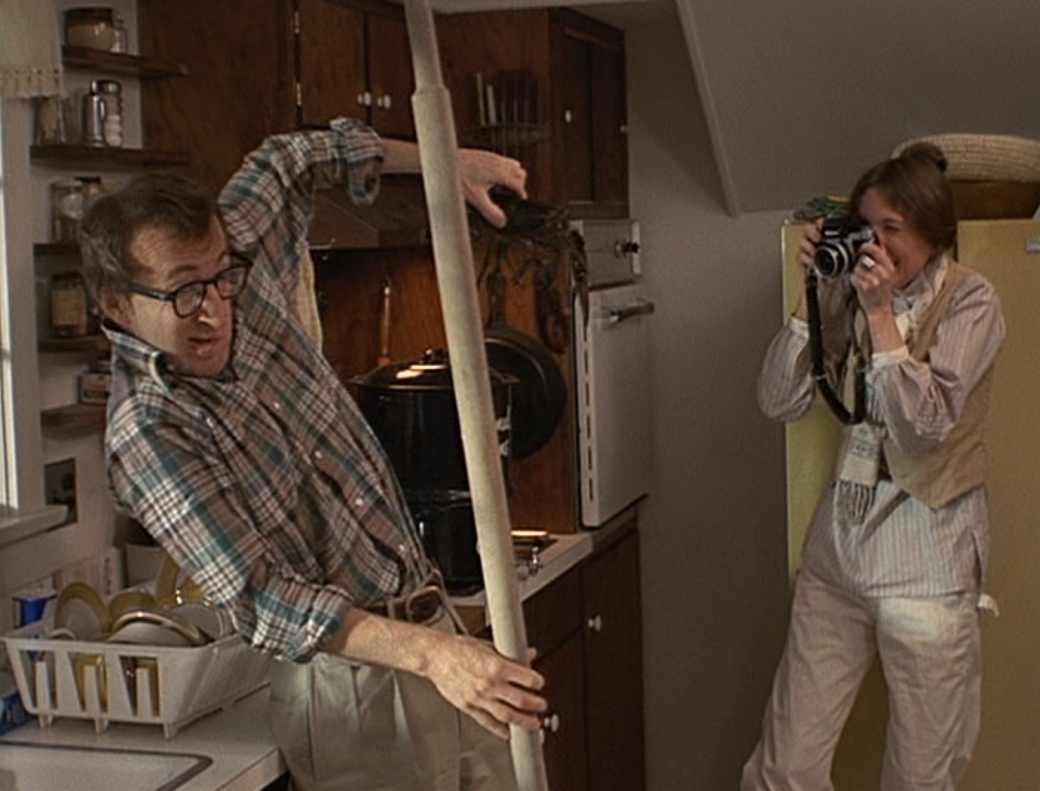
Annie Hall – Woody Allen (1977)
Allen had established a reputation as a cinematic clown over a decade before he and writer Marshal Brickman struck gold by mining Allen’s personal life, his philosophies and phobias, and, most importantly, an honest look at his relationship history with actress Diane Keaton. The result is one of the best romantic comedies ever to grace the big screen, loaded with observations about love, self-identification and, in one of the film’s funniest and most relatable scenes, Marshal McLuhan. Alvie is a crazy quilt of neuroses and Annie an endearing ditz, making the possibilities for laughter endless. Like most relationships, this one was doomed from the start, but it’s Allen’s aversion to sentimentality and his affinity for mutual respect and humble acceptance that make it all work. While we understand his conundrum, we aren’t exactly saddened by the outcome because Allen has let us down gently, accepting the idea of evolution over that of failure: “A relationship, I think, is like a shark. You know? It has to constantly move forward or it dies. And I think what we got on our hands is a dead shark.”

Eternal Sunshine of the Spotless Mind – Michel Gondry (2004)
Only the mind of screenwriter Charlie Kaufman could have re-invented the romantic comedy by deconstructing the entire formula. Michel Gondry runs with the idea that even if we erase all memory of a collapsed relationship, there remains the likelihood that a chance encounter could rekindle it; we can discard memories, but we cannot reinvent who we are. Told in a fractured format, the story is a visual treat as well as a truly sweet romance that pokes fun at human assumptions that we control our destinies. Heartache and loss are as much a part of the deal as falling in love. Kate Winslet’s Crayon-haired Clementine would probably never be able to sustain a long-term relationship with the likes of Jim Carrey’s Joel, but is the final goal longevity? Or is it simply a kernel of truth to forget the time of duration over which we have no control, and to surrender to that wonderful happiness for however long it lasts.

The Lobster – Yorgos Lanthimos (2015)
Lanthimos throws our obsession with coupledom under the bus with his bizarre love story set in an institution (called a hotel) where singles are sent to wait up to 45 days to find a mate match or, failing that, to be turned into an animal of their choice. The rules within that they are required to follow seem to have been adapted from a Match.com questionnaire and are as harsh as the laws that put them there, but David (Colin Farrell), after some truly absurd attempts to hook up with anybody, encounters a nameless shortsighted woman (Rachel Wiesz). The two of them decide to forgo the socially acceptable process of finding a mate and decide to set off on their own. The film is wildly unpredictable, even unnerving in spots, but it has a romantic heart rivaled by none. True love is not only the initial attraction we feel at first and then spend the rest of our lives trying to nurture maintain, it only survives on the willingness of the partners to sacrifice for each other. And the sacrifice in this case is a solid, life-affirming heartbreaker.

¡Átame! (Tie Me Up! Tie Me Down!) – Pedro Almodovar (1990)
Almodovar relishes his role as provocateur almost as much as he enjoys bright colours…almost. What is his solution to is answer to the romcom originality dilemma? By incorporating bondage and the Stockholm Syndrome in the courtship, of course. All by itself, that term boldly illuminates the director’s on with the hunger for establishment coupledom. Ricky (Antonio Banderas) has just been released from a mental institution and is determined to have a normal life with Marina (Vitoria Abril), even if he has to go to great lengths to convince her. Almodovar is renowned for his playfulness, which allows him to step outside normally acceptable lines on any topic – even courtship. The clichéd character of the doggedly-determined suitor, in his hands, becomes a kidnapper, and the apple of his eye – a porn actress he once had sex with. We accept Almodovar’s boldness because we trust him, and he takes us places where – nearly 30 years later – pseudo-titilating films like 50 Shades of Grey fail embarrassingly by playing it coy. Naturally, the film was scorned by North American puritans and some feminist groups, most of whom seem to have forgotten that this little parable played within the same basic construct as other romantic concoctions, from Beauty and the Beast to Pillow Talk. The MPAA unfairly slapped an X-rating on the film (always reserved for hardcore porn), triggering a legal battle and shining a bright light on censorship and sexuality. Eventually, the MPAA created the rating of NC-17 specifically for explicit, non-porn films.
While mainstream Hollywood filmmakers continue to grind out bland, cookie-cutter romcoms, we have to thank creative minds in France, Spain, the UK, Ireland, Greece and NYC (an entity all to itself) to thank, in this case, for keeping this genre vital with their courage and originality.



 10) Los abrazos rotos / Broken Embraces (2009)
10) Los abrazos rotos / Broken Embraces (2009) 9) Carne trémula / Live Flesh (1997)
9) Carne trémula / Live Flesh (1997)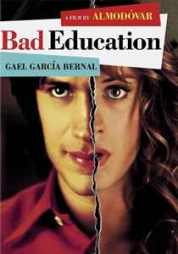 8) La mala educación / Bad Education (2004)
8) La mala educación / Bad Education (2004) 7) Julieta (2016)
7) Julieta (2016) 6) La piel que habito / The Skin I Live In (2011)
6) La piel que habito / The Skin I Live In (2011) 5) Volver (2006)
5) Volver (2006)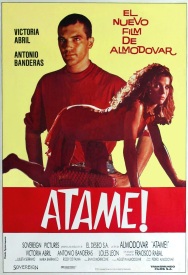 4) Átame! / Tie Me Up! Tie Me Down! (1990)
4) Átame! / Tie Me Up! Tie Me Down! (1990)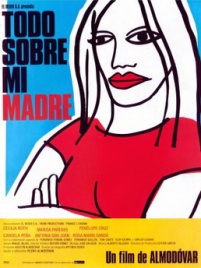 3) Todo sobre mi madre / All About My Mother (1999)
3) Todo sobre mi madre / All About My Mother (1999)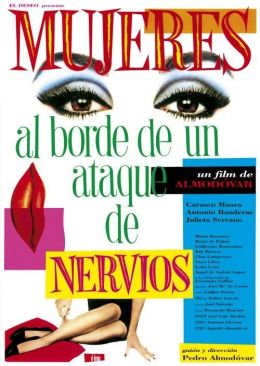 2) Mujeres al borde de un ataque de nervios / Women on the Verge of a Nervous Breakdown (1988)
2) Mujeres al borde de un ataque de nervios / Women on the Verge of a Nervous Breakdown (1988) 1) Hable con ella / Talk to Her (2002)
1) Hable con ella / Talk to Her (2002)












Recent Comments